What my wig means to me: Seven women, seven powerful stories

Hair. It’s incredibly important for a lot of women. It can give a sense of self or identity, be a political symbol or a sign of rebellion.
But what about wigs? Why do some women choose to wear them and what is their significance?
Woman’s Hour speaks to seven women to hear what their wigs mean to them.
Laura Lattimore: I feel mischievous in my wig
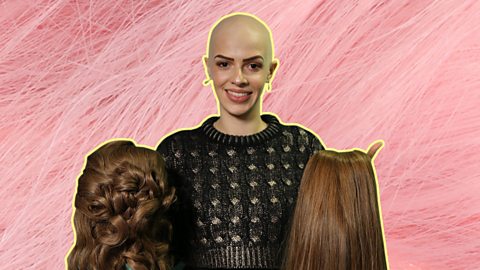
I lost my hair at one. Here's what my wig means to me
Laura Lattimore, 28, lost her hair when she was one and was diagnosed with alopecia.
“I have over 30 wigs now. My wigs are a real part of my life because I’ve worn them for such a long time, I’ve worn them for over 20 years."
"I enjoy the idea that I wear one and potentially not a lot of people know that I’m wearing it."
Laura Lattimore is a 28-year-old blogger from London. She lost her hair when she was one and was diagnosed with alopecia.
“I love looking at them and I love thinking about the times when I was wearing them.
“I wear a wig pretty much all of the time. I don’t exercise in my wigs anymore. And sometimes if it’s really hot, I’ll go out in just a buff, but I rarely go out bald, purely because of the effect it has on my head.
“If it’s sunny, my head will get uncomfortable. If it’s cold, my head gets cold and then I get cold. It’s really a choice I make because I really enjoy wearing the wigs. Also practical as well for me.
“Wearing a wig makes me feel a bit mischievous because I enjoy the fact that I wear one and potentially not a lot of people know that I’m wearing it.
“I enjoy that and it makes me feel mischievous, it makes me feel amazing. It makes me feel really happy that I have an item in my life that brings me a lot of positivity.
“One thing I would say about wearing a wig is that it’s really a choice of the person wearing it.
“For me, I really enjoy wearing them and on YouTube I meet lots of different people who have lots of different attitudes towards wigs.
“I wouldn’t feel pressured to wear a wig just based on what other people are saying to you. I would very much make sure that it’s your choice and that you do a lot of research into the types of wigs because there are so many options now.
“Similarly, if you try them and they don’t work out for you, there are other options. There’s different headwear items and there’s lots of availability around different products, so I would say you don’t have to feel like you have to wear one if you don’t want to.”
Michelle Annan-Baidoo: My wig signifies choice
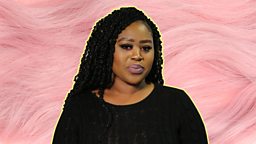
Michelle is 36 and owns her own hair salon in East London. Michelle herself wears wigs every now and again, for ease.
"My only hope is that wigs do not become a dependency for those that may not necessarily need them.”
“On a personal level, wigs for me have been much more like a fun fashion accessory as opposed to a necessity.
“Hairdressing has been in my family for decades so changing my hairstyle on a weekly, sometimes daily basis has most definitely become a normality.
“A wig to me signifies choice. They offer choice and the capability to change your look, a solution to hair loss and sometimes a prerequisite ‘taster’ before a drastic haircut or colour.
“I will always love the look of confusion from other parents when I’m on my daily school run as a blonde bombshell one morning and then as a Regal Afro Queen the following morning!
“Wigs must be championed for their multi-functionality but my only hope is that wigs do not become a dependency for those that may not necessarily need them.”
In recent years, Michelle has made a conscious effort to wear her natural hair out.
“My daughter is very inquisitive and she comes to the salon a lot as well and she’s asking a lot of questions about straightening her hair. She’s seven now.
“I had to instill in her that ‘your natural hair is beautiful, you’ve got beautiful, lovely curly hair’. But I had to look at myself also, my industry.
“I wake up and depending on how I feel, I’ll wear the red wig, or I’ll wear the long blond one, or the straight one.
“So I did have to question, ‘OK, maybe I have to be a better representation for my daughter. For her to see that natural hair is beautiful’.”
Angelina Hall: My wig helped me take control when I had cancer

Angelina Hall is 53 and was diagnosed with breast cancer when she was 45. Within a week and half of chemotherapy, she started to lose her hair.
“I didn’t want to look like a cancer victim. I know it’s right for a lot of people - they just want to wear scarves and hats, but it wasn’t right for me."
“I decided that I couldn’t cope with waking up one day and all the hair being on the pillow, so I got my husband to completely shave my head after about seven days after having the first cycle [of chemotherapy].
“I can’t say that I didn’t shed some tears, but the relief of knowing that I had taken control was fantastic.
“I didn’t want to look like a cancer victim. I know it’s right for a lot of people - they just want to wear scarves and hats, but it wasn’t right for me.
“We decided that I could go and have any colour hair I wanted and any style, and why didn’t I go and get a few different wigs?
“It was my way of...putting two fingers up to cancer and going, ‘I’m going to do glamorous cancer’.”
A few years on, Angelina still struggles with hair loss as a result of the chemotherapy and tamoxifen - a type of hormone therapy.
As a result she turned to a consultancy that offers long-term hair extension at the root which is woven into the hair.
“I actually have a weave now. I can swim with it, I wash it, and it’s just like having my own hair.
“If I want to be proud of myself and feel confident and sexy, this is the way forward.”
Mikai McDermott: People link wigs to being anti-black
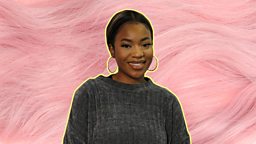
Mikai is 22 and a lifestyle blogger. She’s also a hair stylist and makes and applies wigs. Her clientele is mainly young, black women.
"Sometimes we can just wear a wig and it not be a political statement."
Mikai experimented with her natural hair, dying it and cutting it short. But the heat damage and colour treatment meant that she had to shave it off.
She now wears wigs while she is growing her hair out again.
"To me, wigs are a symbol of versatility and comfort. My wigs allow me to express myself in a multitude of ways and they've become a source of creativity.
"I think that everyone should be allowed to showcase their passions. Wigs allow me to do just that."
Mikai believes when it comes to black women and wigs, there is a lot of politics and internalised racism.
“I guess people do link wigs to being anti-black, or to women internalising self-hatred, but I think sometimes we can just wear a wig and it not be a political statement.
“Does it automatically become ‘Oh I don’t like my afro, so that’s why I’m wearing a wig’, or is it just ‘I can’t be bothered with my hair today so I’m just going to wear my wig’. This is most of the time for me, definitely.”
A lot of Mikai’s clients are young professionals. They are very aware as black women of how to style their hair for work and in a corporate environment.
“A lot of my clients who come to me ask me for a black straight unit [style], because when you go into work places I think they see afros or natural hair as untamed.
“I guess that’s linked to what the Afro represents, it’s linked to large political movements and social change. Going for something straight is always seen as safe.
“As much as I would love women to be able to wear their natural hair to work, or to wear really Afrocentric hairstyles, I can also understand that we are bound by a lot of political or social structures that mean that people need to work, they need to earn money, they need to pay bills.”
Alex Petropoulos: My wig made me look amazing, instead of sick
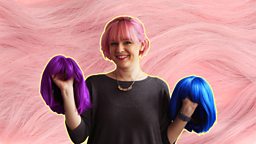
Alex Petropoulos, 34, was diagnosed with breast cancer in late 2016. She began chemotherapy and started to lose her hair within a few weeks.
"I would go out with my crazy electric blue wig and rock the town."
Alex decided to shave it off, but didn’t immediately get a wig.
“I tried a combination of things. I tried a woolly hat for a while, I tried a nice scarf. I wore a really nice scarf out on my birthday and we were out on the town and I just felt like everybody was looking at me like, ‘Oh God she’s a cancer patient’.
“I ended up getting so uncomfortable that I couldn’t handle it.
“We were out in Soho and there was a wig shop. I was like, ‘great, let’s go in!’ It was a costume shop so I bought a bright red wig and the guys in the shop helped me put it on.
“I walked out with this wig on and everybody was staring at me, not because I looked sick but because I looked amazing. That’s why I started wearing the wigs.
“By the time I discovered crazy coloured wigs, that was me taking control and saying, ‘yeah I look different, but I’m owning it’.
“That helped my self confidence for sure. I would go out with my crazy electric blue wig and rock the town.
“I figured that the stuff that I could afford was never going to look like real hair so it was, ‘why not have fun with it?’ So that’s why I went this way.
“Obviously there are occasions where you need to look like a normal human, so I did buy myself one that was dark brown.
“That one didn’t fit very well and I went to a friend’s birthday party and we all started dancing to Bohemian Rhapsody and I started head banging...and the wig just fell off right in the middle of the floor.
“My friends were excellent friends and they all started laughing at me because I was laughing, but [those] who didn’t know me just saw a group of people laughing at a bald girl at a party, so I can’t imagine what they thought!
“I learnt my lesson, it was just like, don’t even bother with the other ones, just wear my crazy ones.”
Alex’s hair has now grown back and she has a short bob. She doesn’t think it will ever grow back as long as it was before treatment.
As a compromise, she now dyes her hair bright colours - just like her wigs. It’s currently bright pink.
Rashida Hardy: I struggle with hair loss but love my wigs

Rashida Hardy is 25 and was diagnosed with Lupus three years ago. It’s a condition that causes inflammation of the joints, skin and other organs.
"It’s just that excitement of, ‘I’m changing my hair today, I’m switching it up’."
She’s experienced severe hair loss as a result of Lupus and wears a wig almost every day.
“I think hair loss was the worst symptom and to this day I do still struggle with it. I used to have a very big head of hair.
“I remember being in school and all the girls would be like, ‘Rashida your hair is so long, you’ve got such beautiful hair’. I was totally in love with my hair.
“I was combing it out in the mirror, I will never forget, and all this hair was coming out with it.
“I was sitting on the bathroom floor with all this hair around me and I was in hysterics. My mum was holding me like a baby.
“I just couldn’t understand what was going on. I had all these bald patches in my hair but I was still trying to hold onto that hair, I wouldn’t shave it off.
“I remember everybody was advising me and everyone was like, ‘Rashida, I think the best option for you is just to shave the hair off and then let it grow back in its own time’. But I remember being like, ‘no’. I just couldn’t imagine the idea of me being without hair.
“I held onto that hair for as long as I could and then I remember trying to do all these hair styles and the hair was so thin and it just didn’t work.
“I remember being absolutely devastated and then just thinking, ‘I’m going to have to get a wig made’.”
Nowadays, Rashida tries to see her wig in a positive light.
“I love my wigs. It’s just that excitement of, ‘I’m changing my hair today, I’m switching it up’.
“I’ve got quite a few wigs. I’ll wake up in the morning and think ‘do you know what, today I just want to have short hair’.”
Maria Edaferhoro: Wearing my wig is a form of self expression
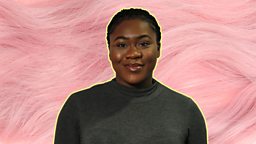
Maria is 25 and lives in London. She used to wear weaves, but has been wearing wigs for nearly two years now. She finds them easier and more practical.
"It's an option I have and that I make the most out of on lazy days."
Maria decided to write about black women and hair for the online and print magazine Gal-Dem after attending a panel discussion on the issue.
In a room of 30, Maria was one of only four women who was visibly wearing a wig or weave.
“I felt as though they were kind of, in a sense, maybe bashing women who wear weaves and who wear wigs?
“At the end of the discussion I stood up and said, ‘I feel as though the women who choose to wear their natural hair out, I feel that there is a sense that they look at those who wear wigs and weaves as “why you wearing wigs and weaves?"' They condemn us almost.
“Wearing wigs for me is another form of self expression and preference, the same way that wearing a particular style of jeans is.
“I wear wigs because they make me feel happy, the same way wearing braids and my natural hair does.
“Wearing a wig is an option I have and that I make the most out of on lazy days or days I need a quick fix.”
The wigs series aired on Woman's Hour in three parts: Listen here for part one, part two and part three.
Reporting: Olivia Cope
Production: Olivia Bolton
For more support and advice on cancer and hair loss, visit Cancer Research UK, Macmillan Cancer Support, NHS or Breast Cancer Care, Lupus UK - Coping with hair loss, NHS - Lupus, NHS - Hair loss, Alopecia UK, The British Skin Foundation - Alopecia Areata



